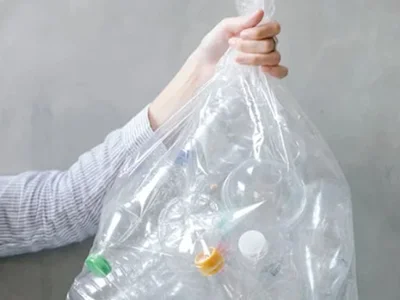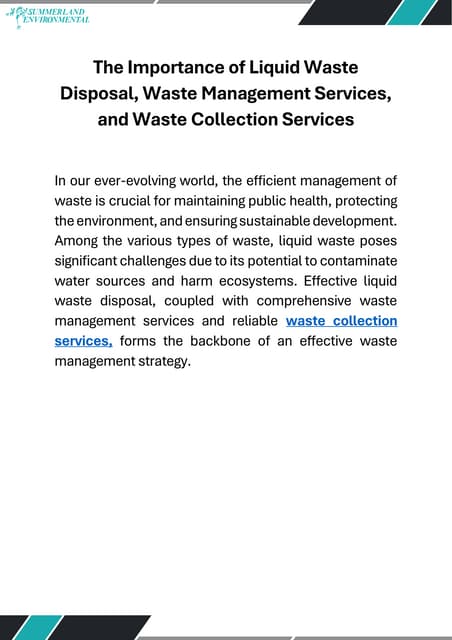The 6-Minute Rule for Reclaim Waste
Table of ContentsThe 30-Second Trick For Reclaim WasteLittle Known Questions About Reclaim Waste.Reclaim Waste Fundamentals Explained9 Easy Facts About Reclaim Waste ExplainedThe smart Trick of Reclaim Waste That Nobody is Discussing
Domestic sewer waste refers to the waste and items from a domestic septic tank. The appropriate management and disposal of residential sewage waste require fluid waste to be transferred to a sewage therapy plant where the appropriate methods and devices are used to purify and dispose of waste.
Business waste typically consists of potential dangers, such as flammable materials or a combination of liquid and strong waste products, and calls for an extra innovative and in-depth disposal procedure. The disposal of business waste usually entails the purification of waste before transport to ensure risk-free and proper disposal. Industrial waste is created from by-products and drainage of commercial processes and production.
This type of waste can not make use of the very same sewage administration transport or procedures as septic or business fluids. The hazardous waste monitoring procedure calls for the evaluation and testing of fluid waste prior to it undertakes the disposal procedure (liquid waste disposal). Drainage waste is the fluid waste that originates from drainage and excess stormwater in highly populated areas or cities
Runoff waste can cause contamination and flooding otherwise handled appropriately. Learn much more about sewer cleaning and waste monitoring. Ensuring proper waste management can prevent calamities and lower ecological damage. Both individuals in domestic settings and professionals in industrial or production sectors can benefit from recognizing the processes and guidelines of fluid waste monitoring.
The smart Trick of Reclaim Waste That Nobody is Discussing
Get in touch with PROS Providers today to discover our waste monitoring and disposal solutions and the proper ways to take care of the liquid waste you generate.
(https://moz.com/community/q/user/reclaimwaste1)Do you understand what happens to your water when you end, flush the toilet or drain pipes the washing device? No? Well, it deserves understanding. This so-called 'wastewater' is not just an important source but, after treatment, will certainly be released to our land, waterways or the sea. Utilized water from toilets, showers, baths, kitchen sinks, washings and industrial procedures is understood as wastewater.

water made use of to cool down machinery or clean plant and tools). Stormwater, a kind of wastewater, is overflow that streams from farming and city areas such as roofs, parks, gardens, roads, courses and gutters into stormwater drains, after rainfall. Stormwater moves without treatment straight to local creeks or rivers, eventually reaching the sea.
All About Reclaim Waste
In Queensland, the majority of wastewater is dealt with at sewer therapy plants. Wastewater is transported from domestic or industrial websites via a system of sewage systems and pump terminals, understood as sewage reticulation, to a sewer treatment plant. City governments develop, preserve and run most sewer therapy plants. Operators are accredited under the Environmental Defense Act 1994 to discharge treated wastewater at an acceptable environmental standard right into rivers.
The Division of Natural Resources suggests city governments concerning managing, operating and keeping sewerage systems and treatment plants. In unsewered locations, city governments might call for homeowners to install specific or home sewage therapy systems to treat residential wastewater from commodes, kitchen areas, shower rooms and laundries. The Division of Natural Resources authorises the use of house systems when they are verified to be effective.
In some brand-new class, treatment of some stormwater to get rid of clutter, sand and crushed rock has begun utilizing gross contaminant traps. Wastewater therapy occurs in four stages: Removes solid matter.
Makes use of small living microorganisms understands as micro-organisms to damage down and get rid of remaining liquified wastes and fine fragments. Micro-organisms and wastes are incorporated in the sludge.
Not known Details About Reclaim Waste
Nutrient elimination is not readily available in any way sewer treatment plants because it requires costly specialised tools. It is coming to be more typical in Queensland. Clear liquid effluent produced after therapy might still include disease-causing micro-organisms. If this effluent is launched into waterways such as rivers or the sea, the micro-organisms will eventually pass away out.

This normally indicates wastewater needs to be treated or pollutants gotten rid of prior to it can be released to waterways. Many wastewater moves into the sewage system. Under the Act, city governments administer approvals and licences for ecologically relevant activities (ERAs) involving wastewater launches that might have a neighborhood effect. The division administers approvals and licences to Ages entailing wastewater launches that may have a regional or statewide impact.
Reclaim Waste Things To Know Before You Get This
Tracking offers valid info regarding water quality and can confirm that licence conditions are being fulfilled. The information obtained through monitoring gives the basis for making water top quality decisions.